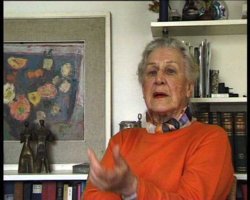

|
Blind Spot
7 out of 10 |
  |
|
Hitler, A First-hand Account What sort of a man can
get himself elected as an absolute dictator in a democracy after openly
stating the intent to start a war that will ruin his nation, a score
of others and murder millions on a selective basis? Were the German
people insane, malicious or was it just a blind spot? After being introduced by her biographer Melissa Muller, Andre Heller asked Junge for permission to record her life story and from over 10 hours of interviews, has captured both her experiences and thoughts about the regime and the man with whom she was employed. It is a simple documentary. Junge speaks about her experiences plainly and without emotion and although very stark and unembellished, it is riveting and sad but historically interesting viewing. She was surprised that he was not as she thought he would be as he gave the impression of being just a kindly old man. She recounts learning to take dictation for the first time, the murder of Joseph Goebbel's children at the hands of he and his wife and Hitler's fearful behaviour during the last weeks of his life. Throughout, she reflects on her first moments seeing and the time spent with Hitler and Eva Braun, thinking both being kind and distinguished. She still claims innocence to any knowledge of the holocaust and was gripped by guilt by her unknowing participation in the regime, questioning her blindness which she now feels she can no longer blame on her youth. She wonders as with many of her generation and those following, why people did not see him as a "criminal," an evil that had to be stopped and how he could remain influential until the end. He just kept telling everyone not to worry because he would take responsibility for everything and to do what he said. He created the aura of a confident man of genius with the answer to all the problems of the German people, yet still retaining the image of a nice old dude who loved his dog. Only after committing suicide in the bunker, did she first began to question this personality cult based on blind confidence. It felt like he had just left them all in a terrible mess. The sheer importance of the events witnessed by Junge, could fill volumes of books or days of celluloid. At just over an hour, it only scratches the surface and of the many questions that could be asked, Heller and Schmiderer only include the basics, leaving out many subjects which could be of interest. Definitely worth viewing, and Blind Spot is a compelling 95 minutes, which although not visually graphic, still at times paints a portrait more haunting than could be captured on film.
Film Critic: Jennifer M Lillies |
|